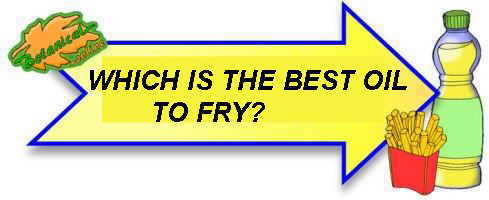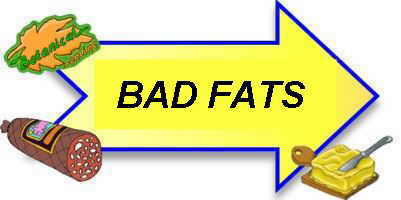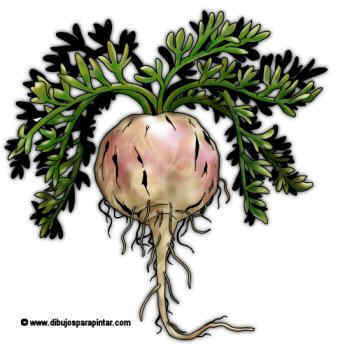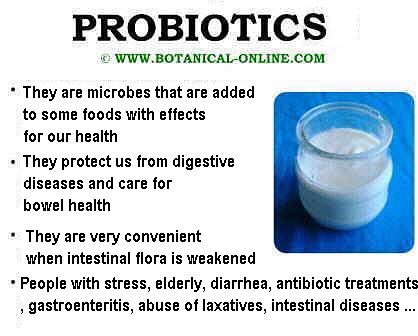What harmful components do heated, fried or burnt oils have?
Are heated vegetable oils harmful?
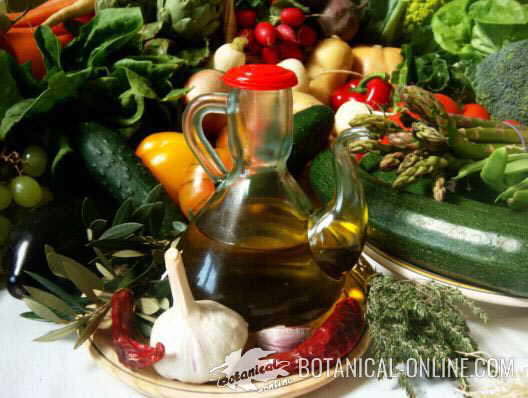 Sofrito is an indispensable component of the Mediterranean diet, and is studied for its beneficial properties by allowing to extract compounds from vegetables and increase their absorption
Sofrito is an indispensable component of the Mediterranean diet, and is studied for its beneficial properties by allowing to extract compounds from vegetables and increase their absorptionThere is no doubt that the best way to consume vegetable oils is raw, as any thermal process at high temperature, either during its processing (refinement), or at home, during cooking, deteriorates its organoleptic and nutritional properties.
- The higher the temperature, the more serious the oil damage and its harmful effects.
Although it would be possible to feed without heating the oils, it is impossible to do without sofritos and many other elaborations with heated oil that mark an entire gastronomic identity culture of many regions.
Let’s see what happens when heating oils, the toxic products that form at high temperatures, and what can be done to avoid the damaging effects of heated oils.
Is all the heated oil bad?
It is important to note that oils only become harmful when they are heated more than they tolerate.
We can say that all oils deteriorate when frying, because frying involves high temperatures, and these deteriorate the chemical structure of fats. But not all oils deteriorate when heated at controlled temperatures: there are oils that resist a certain cooking temperature well.
Toxic components of heated oils
Oils heated to high temperatures are harmful for three main reasons:
- Deteriorated fats: The oils fats are mostly polyunsaturated and monounsaturated. Because of their chemical characteristics, they are sensitive to heat. When high temperatures are applied, these healthy fats deteriorate (such as omega 3 and omega 6) and these lose their benefits and become pro-oxidants of the organism.
- Vitamin loss: High temperatures destroy vitamin E and other antioxidant phytochemicals in oils, such as polyphenols.
- Formation of toxic compounds: High temperatures produce the formation of irritating and toxic compounds, such as acrolein, other toxic substances such as acrylamide, hydroperoxides, peroxides and free radicals are generated. These components damage our cells causing cell aging, cell membrane breaks, mutations or cancer cells.
Which are the oils that can be fried?
In general, there is no oil that is beneficial fried, either because most do not tolerate high temperatures, or because at high temperatures, the proteins and carbohydrates of food also undergo degradation during heating.
To cook at a controlled temperature it is possible to use certain oils that resist a certain cooking temperature without deteriorating excessively. These are mainly those that are rich in monounsaturated and saturated fats, because by their chemical structure, this type of fats does not deteriorate as much with temperature as the polyunsaturated fats (omega 3 and omega 6) of the oils do.
What is the best vegetable oil for frying?
Harmful effects of oils heated in the body
The oils are liquid gold, which, fortunately, today we can find affordable to taste tasty and healthy recipes. However, you must choose well what oil is purchased and if it is suitable for frying.
 Photo of fried zucchini
Photo of fried zucchini
The main problem presented by the ingestion of heated oils is that they increase the oxidative stress of the organism, produce premature aging, and the accumulation of substances harmful to the organism. This is especially harmful in case of pain or inflammatory diseases, which will increase their symptomatology.
The consequences are not as evident in silent diseases as obesity, diabetes or high cholesterol, as fats will accumulate in the atheromatous plaque and only symptoms will appear when arteriosclerosis is established.
How to compensate the fried ones?
Under normal conditions, the body can counteract some harmful effects of fats with the antioxidants provided by fresh vegetables and fruits, although one thing does not compensate the other.
The body uses omega fats (present in oils) to produce new cells. That is, the fats of poor quality of the heated oils will go on to form our cells and tissues. Although vegetables contain antioxidants, will not prevent a diet rich in oils of poor quality to produce a harmful effect on the body.
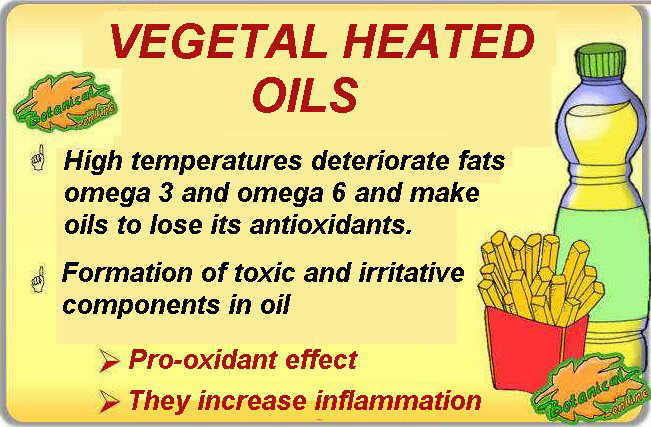 Summary of the problems of vegetable oils treated with high temperatures (refined or heated oils). These oils act as pro-oxidants and are also irritating and toxic because of their content in acrolein, acrylamide and peroxides
Summary of the problems of vegetable oils treated with high temperatures (refined or heated oils). These oils act as pro-oxidants and are also irritating and toxic because of their content in acrolein, acrylamide and peroxides
How to avoid the toxic effects of heated oils
To avoid this, the following tips should be followed:
- Consume few heated oils in the diet. Dr. Kousmine already spoke of this when he recommended in his method “not to consume too many heated oils”.
- Do not abuse the consumption of oils in general because problems can occur due to excess omega fats.
- Omega fats are better obtained from food than from oils for two reasons: nutritional value and better preservation of polyunsaturated fats (these oxidize easily and deteriorate quickly in the oil)
- The oil that is used for cooking must be appropriate, that holds the temperature well without deteriorating
- Check the cooking temperature, avoid that the oil gets too hot and especially that it does not smoke
- Avoid fried foods, snacks, ultraprocessed, etc., which usually contain fats of the worst quality.
![]() More information on oils.
More information on oils.

